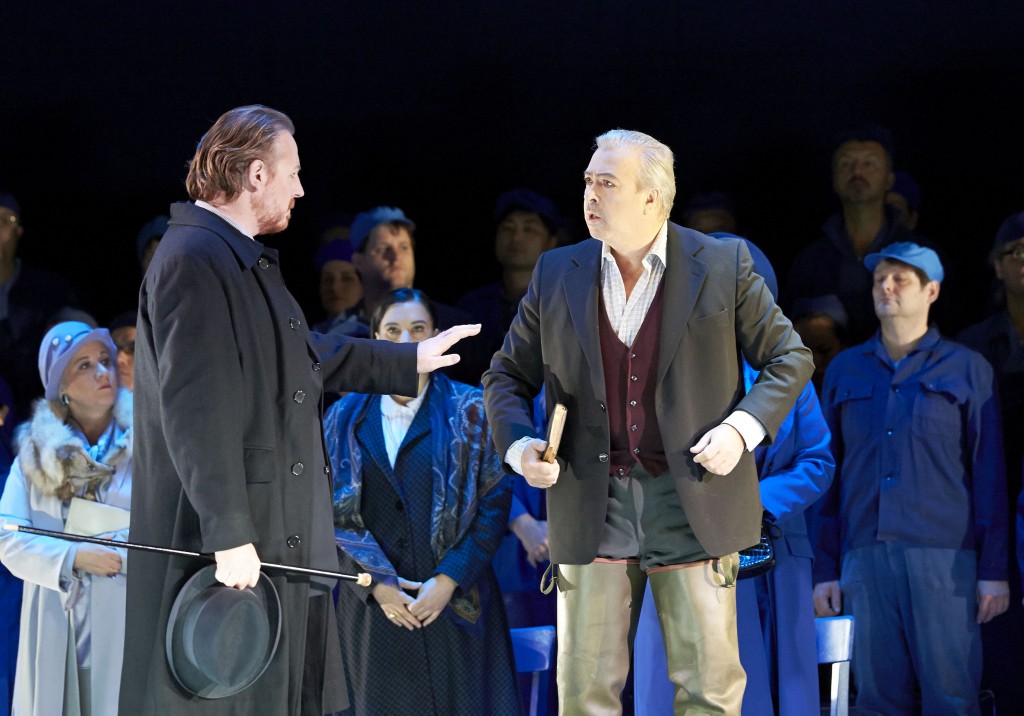 An opera sung in English at Vienna State Opera! Such is the international standing and acceptance of Benjamin Britten’s operas, Britten’s Peter Grimes, amongst others, is part of Vienna State Opera’s repertory, and how fitting to stage it 23rd November to commemorate the centenary of his birth (1913).
An opera sung in English at Vienna State Opera! Such is the international standing and acceptance of Benjamin Britten’s operas, Britten’s Peter Grimes, amongst others, is part of Vienna State Opera’s repertory, and how fitting to stage it 23rd November to commemorate the centenary of his birth (1913).
I can still remember Welsh National Opera’s classic 1990’s Peter Grimes (produced by Peter Stein) colourfully depicting a late 19th Century (1870s) English Suffolk fishing village. Stein decided a certain realism is necessary, starting with the costumes, even including three authentic boats on stage.
Christine Mielitz’s (21st Century) production has the court seated facing us. Grimes’ boy died at sea. Herbert Lippert’s Grimes at first seems too old; white-haired, receding, portly, in a grey jacket and waistcoat. ( He’s meant to marry Ellen.) The judge calls him ‘callous’, ‘brutal’- he’s told to get a fisherman big enough to stand up for himself.
But Grimes the outsider ‘sees and feels what others don’t see.’ He is a visionary, near to madness, who speaks poetically : ‘The dead are witnesses and fate is blind.’ Gottfried Pilz’s minimalist set is high-tech, defined by green neon strips, with a sphere, like a porthole, suspended.
But where’s the sense of the sea- the material inspiration for Britten’s fishing village? In the next scene a storm is breaking. Backstage there are lines of people who appear to be rowing; small boys playing (on deck?) with bars of soap; front stage four reading newspapers in armchairs. In the pub that evening, people coming out of the storm sing of ‘thieving waves which take us in our sleep’. But there’s no real sense of foreboding. ‘We’ve got a ‘prentice for you, Grimes, but there’s no room on the fully- loaded cart’ (a workhouse boy, this is the 19th century). Ellen, the schoolteacher, offers to mind the boy, soprano Gun-Brit Barkmin has beautiful articulation.
In a farcical sequence, the men hold up bright yellow chairs, as if to fend off ‘a high tide no breakwater can stand’ that’s coming to ‘eat the land’. Behind them others are holding suitcases (a sea wall, breakwater?). Grimes and Captain Balstrode (Iain Paterson) are pulling on a rope centre stage. Grimes complains of being offered apprentices ‘workhouse starved’.
Grimes has a vision of marrying Ellen, taking in the apprentice: he’ll show them by setting up shop. In his aria tenor Lippert sings of a harbour where there’ll be no quarrels. (Rather effectively, Grimes stands at the vortex of neon light strips.) Britten’s Sea Interlude is well played before the quarrel, an orgaistic scene, at the Boar, the pub dominated by gaming machines. ‘We live and let live and keep our hands to ourselves’ (pub conversation). Black lurex strips curtain off the backstage, like a bordello. Meanwhile Grimes sings of ‘breathing solemnity in that great night.’ So the general debauchery of ‘the Borough’ is contrasted to Grimes’ poetic ramblings: the Holy Fool. ‘He’s mad or drunk’: or the outbursts of a psychotic? Behind him they’re cavorting in bright red outfits, boogying as if at a revivalist meeting. Ridiculous.
If it fails to evoke the Suffolk fishing setting, what is Mielitz trying to do? A psychological concept, perhaps – a society as trial and jury, Grimes and outsiders the object of surveillance.
 It gets worse. Act 2, Ellen is with Grimes’ new apprentice. There’s a gold covering to the stage (representing a beach), with a Church choir backstage. The boy, with a racket, is playing tennis ! ‘Man alone has a soul to save and goes to church on Sundays’, sings Ellen. So why before this Victorian Church is the boy playing sport? The boy reveals his bruises to Ellen- he’s all black under his shirt- which makes his tennis serves even more absurd. Grimes arrives. He’s seen a shoal, needs help. ‘He works for me: leave him alone, he’s mine.’
It gets worse. Act 2, Ellen is with Grimes’ new apprentice. There’s a gold covering to the stage (representing a beach), with a Church choir backstage. The boy, with a racket, is playing tennis ! ‘Man alone has a soul to save and goes to church on Sundays’, sings Ellen. So why before this Victorian Church is the boy playing sport? The boy reveals his bruises to Ellen- he’s all black under his shirt- which makes his tennis serves even more absurd. Grimes arrives. He’s seen a shoal, needs help. ‘He works for me: leave him alone, he’s mine.’
This Grimes, Lippert, is too introverted, hasn’t got that wild streak. The man Grimes is unable to control his temper. So impatient, lost in visions, he loses it with the boy. Lippert is too gentle to be credible as this unpredictable loose cannon. But it’s beautifully sung, with elegant diction. Grimes hits Ellen, knocks her to the ground (for reproaching him for ill-treating the boy.) ‘Grimes is at his exercise. You can see it from his eyes,’ (sing Chorus), a constant refrain, suggesting the manic.
‘Fishing’s a lonely experience’. Grimes is an outsider. He’s targeted. ‘When the Borough gossips, someone will suffer.’ The Borough keeps its standards up’. The Church worshippers are all in black, when summoned to Grimes’ hut, like a Salem witch hunt:’Now is gossip put on trial.’
Grimes orders the boy to ‘Go there! Now’s the chance: the whole sea’s boiling.’ Hearing the approaching neighbours, Grimes flings out the fishing gear, sends the boy down the cliff face to ‘find that shoal’: the boy slips to his death.
In a disjointed aria Grimes dreams he’s married Ellen, built himself a home: no more fears and no more storms. She ‘will be wrapped around in tenderness, like a purple haze.’Then a nightmare, haunted by visions of his previous apprentice, ‘Stop moaning boy, there’s no more water’. Fine singing from Lippert.
Act 3 concerns the disappearance of Grimes and his apprentice, the jumper Ellen knitted for him found washed up, the Mayor’s posse of the locals to arrest Grimes… But in this chaotic production, in the opening, the Mayor, is having fun with two women. The whole concept is like a Berg 1920s modernist opera- not one of Britten’s Romantic notion. The ‘Good night Dr.Crabbe’ sequence ‘Tonight’ is a dance sequence out of a (Sondheim?) musical.
However, Barkin in Ellen’s aria sings poignantly of how she was brooding on the fantasies of children; only by wishing can she bring some silk into their lives. Britten is pre-occupied with the transition from childhood to adulthood.
The Act 3 sets are metallic, black with gold, high modernism; the backdrop is a New York skyline. In Mielitz’s concept, there’s a Hollywood ball sequence- white deejays and gowns.Then the whole lot are brandishing shot guns-or what. Back in Britten’s opera, Peter Grimes is found by Ellen and Balstrode, hungry, wet and almost insane. Balstrode’s proposed way out is for Grimes to scuttle his boat and sink with it . Grimes’ last aria, his mind disintigrating, sings ‘Deep in calm water, you are near home…Old Joe’s gone fishing.’ He’s raving. Beautifully sung by Lippert, but there’s little menace, or sense of pathos.
Britten’s opera ends with dawn breaking; the Borough come to life to rumours of a boat sinking. The beginning of another day, the Borough is going about its business. The music, Britten’s prologue, is sublime, it should be profoundly moving.
Mielitz’s thoroughly modern design concept is an ego trip too far. Musically this production certainly passes muster, not an ideal cast, but uniformly well sung, Vienna State Opera orchestra perhaps over-driven by Graeme Jenkins, sounding brutally modernist at times.
Mielitz should be sent to the Suffolk coast, to board a fishing boat (if there are any) and preferably, apprenticed to a Mr. Grimes. The shame is that it’s a travesty: doesn’t do justice to Britten’s opera, a masterpiece. There is no sense of wonderment of nature, the power of the sea to drive a man out of his mind. PR. 23.11.2013
Photos: Iain Paterson (Captain Balstrode) and Herbert Lippert (Peter Grimes); Gun-Brit Barkmin (Ellen Orford) ; Herbert Lippert (Grimes)
(c) Wiener Staatsoper/ Michael Poehn
viennaoperareview.com
Vienna's English opera blog
